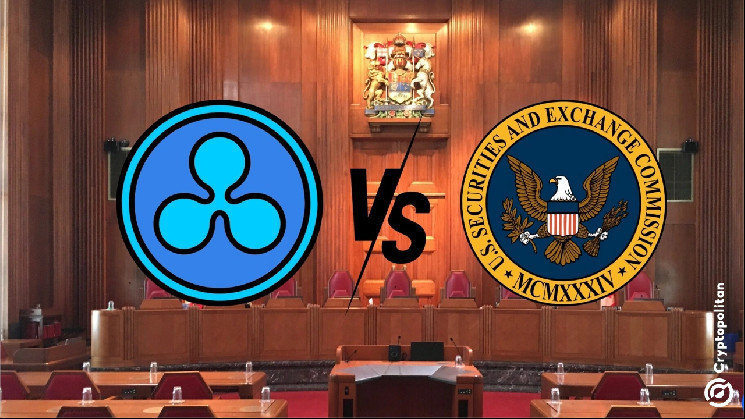The sun is setting on Gary Gensler’s tenure as US Securities and Exchange Commission (SEC) chair, which means all the attention now turns to the agency’s upcoming filing deadline in the ongoing legal tussle with Ripple. The SEC is expected to file its opening brief before January 15, the deadline extended by the 2nd Circuit Court of Appeals.
The SEC, led by Gensler, is set to continue its appeal in the Ripple lawsuit. With a few days left on the calendar before Trump appointee Paul Atkins assumes the head office, former SEC lawyers Marc Fagel and James Farrell have affirmed that the agency is poised to proceed with filing its principal brief soon.
Although Gensler’s imminent departure raises speculation about possible shifts in the agency’s stance, analysts believe the legal groundwork laid by SEC’s chief litigation counsel, Jorge Tenreiro, will stretch the case further. Tenreiro is expected to maintain his role as the plaintiff, and chatter has it the attorney might provide a briefing before the January 15 deadline.
Ripple vs. SEC: Could the end be in sight?
The SEC’s appeal stems from Judge Analisa Torres’ ruling, which failed to definitively classify XRP as either a security or a commodity. The regulator’s legal plea focuses on secondary sales of XRP, including transactions through crypto exchanges, employee distributions, and sales by Ripple executives Brad Garlinghouse and Chris Larsen.
Pro-XRP attorney John E. Deaton has been vocal about the far-reaching implications of the lawsuit, which he argues has caused significant harm to Ripple’s business. Deaton criticized the SEC’s complaint as excessively broad, stating:
“The SEC’s Complaint against Ripple and XRP is, without question, the most grossly over-broad Complaint possibly ever filed by the SEC.”
~ Deaton
He has suggested that the SEC’s efforts to target Ripple may be part of a broader coordinated attempt to undermine the company and its digital assets.
Deaton also pointed out that several individuals involved in the filing of the lawsuit later aligned themselves with Ripple’s competitors, raising concerns about conflicts of interest.
Ripple’s legal strategy involves citing SEC overreach
Ripple’s Chief Legal Officer, Stuart Alderoty, has also voiced concerns about the SEC’s overreach, particularly in its attempts to regulate cryptocurrencies beyond its legal mandate. Alderoty argued that the SEC’s jurisdiction should remain confined to securities transactions and warned against expanding its reach to other types of digital assets.
Let’s hope these principles won’t need repeating in 2025 and beyond:
1.The SEC only has jurisdiction over security transactions.
2.Selling a gold bar with a contractual right, title, or interest in my gold mine? Likely a security transaction.
3.Selling that same gold bar without…— Stuart Alderoty (@s_alderoty) December 31, 2024
He used the example of selling a gold bar with additional rights attached, which could be considered a securities transaction. However, if the gold bar is sold without any post-sale obligations, it should not fall under the SEC’s purview.
Alderoty urges the SEC, under Paul Atkins, to adopt a clearer and more legally sound approach to cryptocurrency regulation, a sentiment that many in the industry share.
The impact of Gensler’s departure
Gensler’s resignation has put smiles on the faces of the crypto community, to put it lightly. Many are hopeful for a change in direction under Paul Atkins, who has been appointed to take over as SEC Chairman.
Legal experts, including pro-XRP lawyers Jeremy Hogan, Fred Rispoli, and Bill Morgan, believe that the lawsuit may see resolution under Atkins’ leadership. Atkins is widely regarded as a pro-crypto figure, and his tenure could mark a shift toward clearer, more balanced regulation for digital assets.
Alderoty has called for a “cleanse” of the SEC’s actions under Gensler, particularly in reference to former SEC official William Hinman’s controversial remarks about cryptocurrency regulation. The XRP lawyer believes that the agency must restore trust within the industry, and Atkins’ appointment could be the key to bringing a fresh perspective to the SEC’s handling of crypto-related issues.
Recent statements by SEC Commissioner Hester Peirce suggest that the agency is moving away from a “regulation-by-enforcement” approach, a shift that could influence the resolution of the Ripple case. Peirce, a vocal critic of the SEC’s regulatory tactics, emphasized the need for a more proactive approach to cryptocurrency regulation.
Speaking at the Blockchain Association Policy Summit earlier this month, Peirce stated that the SEC has a “big toolkit” for addressing digital assets but must use it judiciously.
Whether the SEC will continue its aggressive stance or seek a more conciliatory approach is a question that will be answered with time. However, the outcome of this lawsuit could have significant ramifications for the broader cryptocurrency landscape, especially if the regulator’s appeal is successful.
Meanwhile, XRP has seen some fluctuations in its price recently. It is currently trading around $2.40, marking a 1.3% uptick in the last 24 hours. However, the cryptocurrency’s trading volume has dipped by 13% during the same period.
XRP price. Source: TradingView
The downtrend in volume could mean investors are taking up holding positions, hoping for a price surge ahead of the January 15 court session. Additionally, data from Coinglass indicates that XRP futures open interest has risen by 6%, signaling potential upward momentum in the near term.
A Step-By-Step System To Launching Your Web3 Career and Landing High-Paying Crypto Jobs in 90 Days.
Read the full article here

